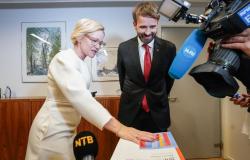Foreigner Angelo
Today, Norwegian salmon has a 33 per cent tariff when entering India. And the customs duty has been the subject of sometimes large fluctuations. It will now drop to 0 percent over the next five years.
That makes the Norwegian seafood industry rejoice. Among them Polar Quality, which today has about half of the salmon market in India. Which as of today is vanishingly small.
– Exports to India make up perhaps one percent of our turnover. We have 17 employees there, who work with distribution and sales. We certainly hope for great growth now, says Jarle Solemdal, who is chairman of the board of the company, to the NNN employee.
Hoping for more jobs
The volume for exports of Norwegian fish to India is vanishingly low today. Last year, 1.2 million tonnes of salmon were exported in total – only 26 of these 1.2 million went to India.
– Salmon in India today is like oysters here in Norway, it’s something you rarely indulge in at a restaurant, says Solemdal.
In other words, there is room for growth in the country with the largest population of any in the world – 1.4 billion, of which around 900 million are counted as fish eaters.
India has overtaken Britain as the world’s fifth largest economy. Now for large parts of Norwegian industry, not just the fish, zero customs duty into India during a five-year period.
– Here there are enormous opportunities for Norwegian business, including fish. After the EEA agreement, this will be our most important trade agreement. It is a young population that is concerned with quality. Today, the salmon industry has experienced great unpredictability. Now they get a completely different opportunity, and I hope they seize it, says Minister for Business Jan Christian Vestre to the NNN worker.
Both he and Polar Quality hope that it will also provide growth for the Norwegian fishing industry.
– I believe in growth in both Indian and Norwegian workplaces. We have set up a small smokehouse and a small filleting department in India, for example. But this is mostly for surplus fish. Today we send our smoked fish from Poland to India – with the trade agreement we can choose to do this in Norway, says chairman Solemdal.
Jarle Solemdal hopes Norwegian fish exports and the Norwegian fishing industry will grow when the tariff to India is removed.
Foreigner Angelo
Little attention
The new free trade agreement with India has been worked on for many years. Vestre itself calls the agreement a “game changer” – but since the signing on 10 March, it has not received much attention.
That was part of the reason why the Ministry of Trade and Fisheries organized a breakfast meeting on Thursday. Among the guests was Professor Kalle Moene. He warned the business world against being too blue-eyed when they are about to enter a large and different economy from the Norwegian one.
– I myself have been a little critical of China in my youth. Don’t make the same mistake now when you enter India! Business may have an interest in downplaying human rights, and that is where India has its problems, said Moene.
Who nevertheless congratulates the government on the trade agreement, which he calls impressive for several reasons.
– This is a double win: It is a plus for the EFTA countries, and the government in India has been skeptical of several trade agreements.
Moen believes that free trade has traditionally been an issue for the left in politics.
– Free trade is not just business. It has also been important to reduce privileges for those who own land and so on. Trade has often gone hand in hand with the development of the welfare state in most countries, says Moene.

Kalle Moene believes that the left in politics must appreciate the positive aspects that come with international trade agreements.
Foreigner Angelo
Breakthrough for workers’ rights
And the steaming fresh trade deal with India could play an important role for Indian workers. The agreement, which has been concluded with the EFTA countries Norway, Iceland, Liechtenstein and Switzerland, has a separate chapter on workers’ rights.
It clearly states that the parties are committed to equal rights for all genders. And that they must both respect and fulfill fundamental worker rights. They must also work towards incorporating the parts of the ILO Convention that they have not yet ratified.
– It is a good step in the direction of a better and more equal working life in one of the world’s largest economies, LO leader Peggy Hessen Følsvik has previously stated about the agreement.
To include such parts in modern trade agreements must be included, says Industry Minister Vestre. Which calls it all a “trade agreement 2.0”.
– It was a difficult topic at times. And it is the first time that India has agreed to include such a chapter in a trade agreement, but we were very clear that this must be included, says Industry Minister Vestre.
Tags: Norwegian salmon conquer India growth Norwegian fishing industry
-




